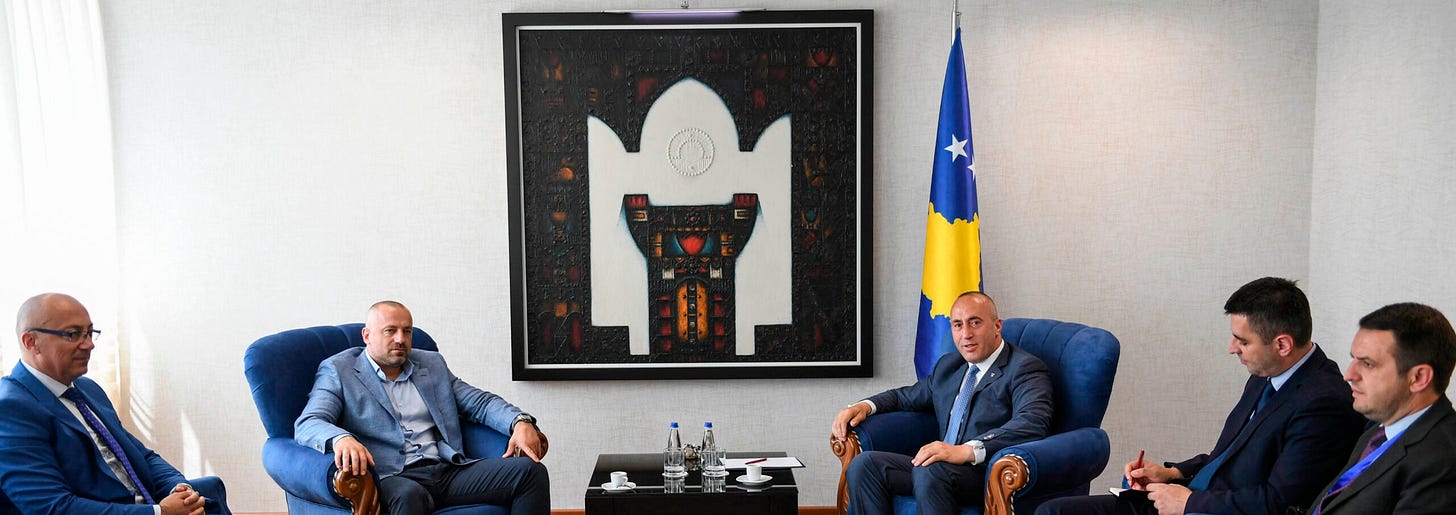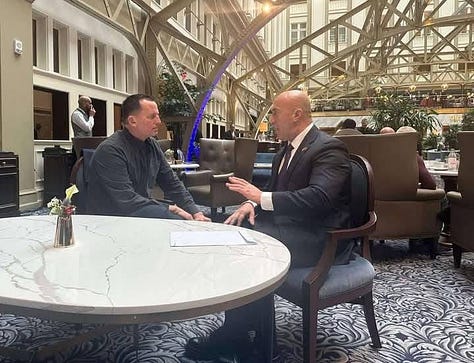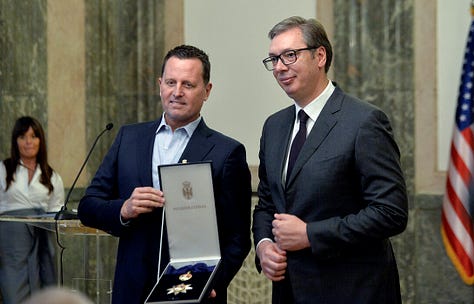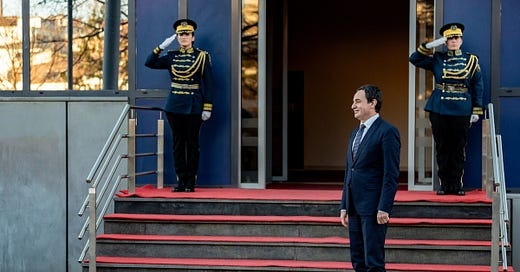Kosovo’s Political Mafia: Will They Stop at Nothing to Take Down Albin Kurti?
A corrupt old guard, an assassination plot, and a media machine, inside the campaign to bring down Kosovo’s reformist Prime Minister, Albin Kurti.
Since 2021, Kosovo has experienced a significant political shift following the landslide victory of Prime Minister Albin Kurti and his administration. This electoral upheaval ended two decades of governance by political parties widely associated with corruption and organised crime. A cornerstone of Kurti’s leadership has been the push for anti-corruption reforms, particularly legislation targeting unjustified wealth among political elites1. Unsurprisingly, this has provoked a backlash from entrenched power structures, oligarchs, and their affiliated media outlets.
While opposition to reform is expected in any democracy, the nature and intensity of attacks on Kurti suggest a more coordinated and possibly preemptive campaign. The question now arises: is this a political offensive aimed at discrediting him ahead of upcoming elections, or is it a warning sign of something more dangerous?
Haradinaj, Prek Kodra, and the Shadow of Political Violence
Former Prime Minister Ramush Haradinaj, a prominent opposition figure, has long been associated with Kosovo’s old political guard. His political manoeuvres have now resurfaced in a forceful campaign against Kurti. However, his alleged connections to figures involved in violent plots raise serious concerns about the broader implications of his opposition.
Foreign intelligence sources have linked Haradinaj to Prek Kodra, an Albanian national with a history of contract killings and an expertise in high-profile assassinations. In 2021, Kosovo’s Counter-Terrorism Unit uncovered an alleged plot to assassinate Kurti and two other officials. Leaked emails from then-Albanian State Police General Director Gledis Nano2 suggest that Kodra was at the center of this conspiracy, with a mission to destabilise Kosovo’s government. Kodra’s criminal record is extensive, including premeditated murder and illegal possession of firearms. Despite being labeled highly dangerous, his arrest warrant was mysteriously suspended in 2021, raising questions about possible political interference.
Kodra’s operational network reportedly spanned Albania and Kosovo, targeting Ismet Haxha, a former operative of the Kosovo Intelligence Service, and Xhavit Haliti, a senior PDK official.
Since late 2023, Haradinaj’s public statements have taken on an increasingly aggressive tone. He has frequently accused Kurti of being a Serbian collaborator, a claim echoed by affiliated media outlets. In October 2024, KOHA Ditore reported3 Haradinaj’s assertion that Kurti was working with Serbian elements, citing leaked wiretaps. Similarly, in 2023, Kallxo.com4 highlighted Haradinaj’s attempts to discredit Kurti’s past, questioning his wartime role. Security experts in London, Berlin and Washington suggest that such rhetoric is part of a deliberate campaign to delegitimise Kurti, creating a hostile environment where, if something were to happen to him, public perception might already be conditioned to accept it as a justified outcome.
Despite these accusations, no credible international intelligence reports or governmental actions support the claim that Kurti collaborates with Serbia. In fact, Belgrade has openly expressed concerns about Kurti’s leadership, identifying him as a threat to Serbian interests5. This contradiction further underscores the potential ulterior motives behind Haradinaj’s narrative.
Albin Kurti’s uncompromising stance on sovereignty and his refusal to yield to Serbia’s influence have positioned him as a singular force in Kosovo’s political landscape. His leadership has not only disrupted entrenched corruption networks but has also upended Belgrade’s strategic ambitions in the region. According to Agim Nesho, a seasoned Albanian diplomat and former ambassador to the U.S., this has made Kurti a target of coordinated opposition both within Kosovo and abroad. "Among all Albanian leaders, Vucic hates Kurti the most because he is strong, incorruptible, and fluent in Serbian, giving him direct influence over public opinion and students in Serbia. He has dismantled every nationalist scheme Vucic has attempted to advance at Kosovo’s expense," Nesho noted in a recent discussion in Washington. His assessment underscores the gravity of the forces aligned against Kurti—ranging from domestic oligarchs to foreign political actors intent on reshaping Kosovo’s trajectory to their advantage.
Since Kurti’s arrival in government, he has actively maneuverer to rule out previously signed agreements from 2013 and 2015, which aimed to cement Serbia’s influence in Kosovo, most notably, the creation of the Association of Serb Municipalities in Kosovo. Some, including Westminster University lecturer Dr. Aidan Hehir, have warned that such agreements would further entrench Serbia’s grip on Kosovo6. Kurti’s refusal to implement these agreements infuriated Serbia, which then attempted a Russia-style annexation of northern Kosovo, reminiscent of Crimea’s annexation in 2014. In September 2023, Kurti’s administration successfully thwarted this operation7, leading to a series of measures aimed at dismantling Serbia’s parallel structures in Kosovo8. His government subsequently outlawed the use of the Serbian dinar, shut down Serbian-controlled banks, illegal distributors, and telecommunications, and dismantled municipal parallel structures, many of which were operated by organised criminal networks tied to Belgrade. Among them was Milan Radoicic, a notorious figure with deep connections to Serbia’s political elite9 and Kosovo’s former ruling parties. He led the Serbian-backed paramilitary operation of September 2023, known as the Banjska attacks10, which resulted in the killing of a Kosovar police officer. After abandoning his armed men, Radoicic became a wanted fugitive in Kosovo. He is also blacklisted by the United States, the UK and remains at large under the protection of Belgrade. Notably, during Ramush Haradinaj’s tenure as Prime Minister, Radoicic was openly welcomed at the PM’s office11, raising further questions about the opposition’s motivations in challenging Kurti’s policies.

The Skenderaj Incident: A Calculated Provocation?
Sami Lushtaku has long been associated with orchestrating fabrications and violent attacks against individuals who pose a threat to his wealth and political influence, which have reportedly been amassed through dubious means. His involvement in politically motivated violence and suppression of opponents has been well-documented, with allegations linking him to numerous cases of intimidation, defamation, and even assassination attempts.
This history casts a dark shadow over the events in late January 2025, when hostility against Prime Minister Albin Kurti escalated during a campaign event in Skenderaj12, a stronghold of the opposition PDK. Justice Minister Albulena Haxhiu accused13 Lushtaku, who serves as Skenderaj’s deputy mayor, of deliberately using his vehicle to obstruct Kurti’s convoy, an act that intelligence sources believe was an attempt to provoke a staged accident.
"Last night, Sami Lushtaku personally attempted to attack the Prime Minister’s convoy. Using an official vehicle from the Municipality of Skenderaj, he blocked the Prime Minister’s path with intent to attack." — Albulena Haxhiu.
Beyond this, reports indicate that Lushtaku’s associates orchestrated a disruption involving over a hundred individuals, who threw fireworks at Kurti’s supporters, intimidating those attending the event. The NGO Democracy in Action condemned the attack14, calling it a direct assault on Kosovo’s democratic process.
Lushtaku’s alleged role in this provocation is not an isolated case. In 2020, he was linked to the shooting of lawyer Gazmend Halilaj, who had publicly confronted him. According to the Kosovar outlet Indeks Online,15 Halilaj was shot outside his home by two armed individuals just days after a verbal altercation with Lushtaku. Though Lushtaku denied involvement and threatened legal action against Halilaj for defamation, the attack raised serious concerns about his use of violence to silence critics. However, as Telegrafi16 later reported, Lushtaku was found guilty of threatening Halilaj and was fined 2,000 euros by the court. Additionally, Lushtaku’s relatives, Ibrahim Lushtaku and Xhelal Zeqiri, were separately charged with attempted murder for ambushing Halilaj, ramming his vehicle, and firing gunshots in his direction.
Lushtaku, already blacklisted by the U.S. Treasury for organised crime17, has close ties to Ramush Haradinaj’s faction, further solidifying concerns that elements within Kosovo’s opposition may be escalating tactics beyond political opposition. Notably, Daut Haradinaj, Ramush Haradinaj’s brother and an Alliance for the Future of Kosovo (AAK) candidate in the 2025 elections18, is also blacklisted by the U.S. government19.
Given Lushtaku’s history of eliminating perceived threats through coercion and violence, the Skenderaj incident fits a broader pattern of impunity enjoyed by figures with deep political and economic influence in Kosovo. The attack on Kurti’s convoy raises urgent questions about whether the opposition is resorting to increasingly aggressive and dangerous measures to maintain control.
The Devolli Oligarchy and the Machinery of Disinformation
The Devolli business empire, deeply embedded in Kosovo’s political and economic system, has spearheaded a coordinated media offensive against Prime Minister Albin Kurti. Backed by oligarchic interests threatened by anti-corruption reforms, key outlets, Klan Kosova and Nacionale, have amplified false narratives20 to destabilise his government ahead of the February elections.
But this disinformation machine extends beyond a single outlet. Gazeta Express, founded by allies of Hashim Thaçi, and Nacionale, run by former PDK politician Berat Buzhala21, have played a key role in obstructing anti-corruption efforts while shielding figures linked to organised crime.
One of the most blatant manipulations has been the concealment of the Prek Kodra case. A contract killer implicated in a 2021 assassination plot against Kurti, Kodra’s alleged links to Ramush Haradinaj, Sami Lushtaku, and Kosovo’s judiciary raised concerns over political interference when his arrest warrant was mysteriously suspended. In 2022, broadcaster T7—once founded by Buzhala, hosted Artan Hoxha, who downplayed Kodra’s crimes and spread false financial claims about a police cash seizure linked to him22. Two years later, Hoxha was arrested by SPAK for alleged ties to organised crime and intelligence gathering for criminal networks23.
By late 2024, some opposition-aligned media, Gazeta Express24, Nacionale25, and others linked to Haradinaj and Lushtaku, pushed contradictory narratives about Kodra’s fate. Some others falsely claimed he was detained26, while European intelligence sources confirmed he remains at large. This deliberate cover-up exposes the deep entanglement of media, corruption, and organised crime in Kosovo.

Berat Buzhala’s media empire has worked to deflect scrutiny27, while his ties to US-blacklisted figures28 including Artan Grubi29, Zvonko Veselinovic30, and Sami Lushtaku31, raise concerns about his real allegiances. Reports suggest his network has fabricated scandals against Kurti, in coordination with elements of the judiciary and foreign actors.
The European Parliament’s 2021 report32 on disinformation flagged Klan Kosova and Buzhala’s former outlet, Gazeta Express, as key players in a broader propaganda effort, echoing Serbia’s Kremlin-backed campaign to weaken Kosovo diplomatically.
This disinformation campaign33 is more than political opposition, it is a deliberate effort by oligarchs and criminal-political networks to maintain control, obstruct reform, and, if necessary, remove Kurti. The question remains: how far will these forces go to stop him?
Haradinaj’s Meeting with Richard Grenell
Amid these developments, Haradinaj’s January 2024 visit to Washington, D.C., has drawn scrutiny34. While publicly claiming to attend a White House inauguration, he instead met with Richard Grenell, a former acting U.S. National Intelligence Director under Donald Trump and a vocal opponent of Kurti. Grenell played a pivotal role in orchestrating Kurti’s removal in 2020 and has long standing ties to Serbian political interests. Just 31 days after Serbia’s paramilitary aggression attempt to annex northern Kosovo (Sept 24, 202335) in a Russian styled annexation of Crimea, Serbian President Aleksandar Vucic awarded Grenell36 with the "Order of the Serbian Flag."



Grenell’s record raises broader concerns. ProPublica investigations37 linked him to aiding Moldovan oligarch Vladimir Plahotniuc, who faced sanctions for corruption and Russian affiliations. The Washington Post38 have documented his ties to Hungary’s Viktor Orban, a leader with strong Russian-backed political influence. Well-informed European sources told Gunpowder Chronicles that Grenell is believed to be associated with a network of Russian intelligence-linked organised crime figures from former Yugoslav republics, allegedly working to undermine European institutions of justice through media outlets allied to him in Kosovo. Given this background, Haradinaj’s meeting with Grenell suggests potential coordination in efforts to destabilise or remove Kurti from power.
Sources within Western government circles, speaking to Gunpowder Chronicles and said that Haradinaj’s meeting with Grenell may have been the moment he sought final approval to take down Kurti by any means necessary. Grenell’s fingerprints are all over the 2020 overthrow of Kurti’s administration, a coup that temporarily removed him from power, only for the people to respond with a landslide victory in February 2021 that cemented Kurti’s leadership and crushed those who sought to silence him.
Upon returning from Washington, Haradinaj rushed to Klan Kosova39, claiming that in the U.S., Kurti is seen as having "suspicious agendas." He further stated that Grenell personally assured him that Kosovo would be on his portfolio, despite having no formal role in Trump’s Balkan policy. "Kurti is not interested in good relations with the U.S.," Haradinaj said, suggesting that removing him would ‘save Kosovo.’ Grenell agreed, according to Haradinaj.
Yet, Haradinaj never met Trump, who instead assigned Grenell to manage fire relief funds in California40, not Balkan diplomacy. Grenell has no authority to speak for the U.S., but his criminal network-aligned media continue to push the illusion that he is Washington’s voice.
His relentless attacks on the Special Court in The Hague, Prosecutor Jack Smith, and Kurti, while receiving honours from Serbia41, suggest a chilling reality: Grenell may not just be involved, he may be leading the foreign-backed plot to remove Kurti once again.
Noel Hadjimichael, a seasoned security and geopolitics commentator in London, offered a blunt assessment of Kosovo’s turbulent political landscape. Speaking to Gunpowder Chronicles this week he said: "these people, their whole identity is power and wealth," he said, dissecting the opposition’s unrelenting campaign against Prime Minister Albin Kurti. He described the tactics at play "dirty, hard, robust politics"— and warned that Kurti's reformist stance has placed him in an increasingly precarious position. While political smears and disinformation are expected, Hadjimichael suggested that the escalation of rhetoric and covert manoeuvres could signal a more ominous endgame. "A successful assassination attempt, even by a small margin, could make him into a martyr," he observed, emphasising the high stakes of Kosovo’s volatile power struggle.
Hadjimichael was also unimpressed by Ramush Haradinaj’s attempt to leverage Richard Grenell’s comments as political ammunition in Kosovo. "Today's rooster, the male who is in charge of all the chickens, is tomorrow's feather duster," he quipped, dismissing the weight of foreign endorsements in domestic battles. Haradinaj’s meeting with Grenell, who played a key role in ousting Kurti’s first administration and was later honoured by Serbia’s president was less about diplomacy and more about manufacturing legitimacy for a campaign against the sitting prime minister. Hadjimichael viewed the move as a calculated but flimsy ploy. "A foreign politician’s opinion means little unless the people accept it," he noted, emphasising that in the end, it is Kosovo’s electorate, not Washington’s political leftovers, who will decide Kurti’s fate.
The Warning Signs: Is Kurti’s Safety at Risk?
Kurti isn’t just facing political opposition, he’s walking a tightrope between reform and retaliation. His crackdown on corruption has enraged Kosovo’s old guard, their criminal networks, and their foreign backers. Now, the attacks are escalating. IFIMES warns42 that a rogue faction within the judiciary, in coordination with foreign actors, is preparing a fabricated scandal against Kurti and his closest allies, set to explode at the peak of the election campaign.
This isn’t politics as usual; it’s a carefully staged ambush designed to erode public trust and weaken the only leader in decades to take on Kosovo’s entrenched corruption.
But smear tactics may not be the endgame. The chilling reality is that Kurti could be facing something far worse. The assassination plot uncovered in 2021 may not have been an isolated event but rather a warning shot, a prelude to what happens when reformers refuse to play by the old rules. The Skenderaj provocation, the intensifying rhetoric, the convergence of criminal elements and political operatives, these are not mere coincidences. If history is any guide, a leader who disrupts the interests of oligarchs, political mafias, and foreign powers does not merely face defeat at the ballot box. He becomes a target.
The real question now is not just whether Kurti will survive politically, but whether he will survive at all. If his enemies succeed, it won’t just be a man who falls, it will be the future of a country that dared to break free from its past and Kosovo won’t just lose a prime minister. It will lose the future it has been fighting for.
The draft law on the Asset Forfeiture Bureau is approved in principle — KOHA Ditore.
Publikohen e-mail-et e Gledis Nanos/ Plan për vrasjen e kryeministrit të njohur shqiptar dhe zyrtarë të tjerë, i dyshuari ekspert në përdorimin e snajperit. Zbardhen të gjitha detajet — SOT.AL
Haradinaj: Kosovo is being led by Serbia's spy, Albin Kurti — KOHA Ditore.
Situata politike, AAK mbledh shoqatat e dala nga UÇK-ja, përfaqësues të të pagjeturve dhe ish-të burgosurve politik — Kallxo.com
Đurić: Kurti's regime should be politically isolated and marginalized — Serbia’s MFA.
A deal or a trap? — Dr. Aidan Hehir, Kosovo 2.0 Magazine.
Kosovo PM Haradinaj Criticised For Meeting Northern Powerbroker — Balkan Insight.
Kurti kërkon votën në Drenicë mes hedhjes së mjeteve piroteknike — KOHA Ditore.
Albulena Haxhiu, Kosovar Minister of Justice — Facebook Post.
DnV për tensionet në Skenderaj: Aktet e tilla bien në kundërshtim me parimet e demokracisë — KOHA Ditore.
Policia jep detaje për plagosjen e avokatit Gazmend Halilaj ku u përmend edhe Sami Lushtaku — IndeksOnline.
LUSHTAKU, Sami, Regional Task Group 2 Commander of Kosovo Protection Corps (KPC) (DOB: 20 Feb 1961; POB: Srbica, FRY) (individual) [BALKANS] — U. S., Department of the Treasury.
Daut Haradinaj bën homazhe për të rënët në masakrën e Rogovës së Hasit — KLAN Kosova.
Daut Haradinaj US Sanctions List — U. S., Gov.
Complex Interplay of Media Influence and Political Power in Kosovo — FRONTLINER.
Artan Hoxha speaking to Leonard Kerçuku in T7 — T7 YouTube Channel.
Del në tjetër version: Prek Kodra s’ka lidhje me planin për eliminim të Kurtit — Gazeta Express.
Rrëfimi i Prek Kodrës: S’jam snajperist, Policia e Kosovës më pyeti për dikë me mbiemër Kelmendi — Nacionale.
Gazetari Hoxha: Prek Kodra është thjesht një gjahtar i malit - nuk është vrasës profesionist — Nacionale.
Artan Hoxha: Prek Kodra ka ndihmuar Renean, mediat po merren me një njeri që është i lirë — Nacionale.
SPAK’s Elbasan arrests include suspected sniper in alleged assassination plot against Kosovo PM Albin Kurti — Albanian Times.
Accountability Actions to Counter Global Corruption and Human Rights Abuses in North Macedonia— US State Department.
Treasury Targets Corruption Networks Linked to Transnational Organised Crime — US State Department Treasury.
LUSHTAKU, Sami, Regional Task Group 2 Commander of Kosovo Protection Corps (KPC) (DOB: 20 Feb 1961; POB: Srbica, FRY) (individual) [BALKANS] — U. S., Department of the Treasury.
Mapping Fake News and Disinformation in the Western Balkans and Identifying Ways to Effectively Counter Them — EU Parliament.
Grenelli is honored in Serbia by Vuçiqi, mentions Hashim Thaçi — KOHA Ditore.
Richard Grenell did not disclose payments for advocacy work on behalf of a Moldovan politician whom the U.S. later accused of corruption. — ProPublica.
U.S. Bans Fugitive Moldovan Tycoon From Entry For 'Significant Corruption' — RFE.
Vladimir Plahotniuc — Open Sanctions.
Treasury Targets Corruption and the Kremlin’s Malign Influence Operations in Moldova — U. S., Treasury.
Richard Grenell’s paid consulting included work for U.S. nonprofit funded mostly by Hungary - Washington Post.
Haradinaj me paralajmërime të forta pas vizitës në SHBA: Administrata Trump nuk do të na toleroj — KLAN Kosova.
Vucic presents Richard Grenell with Order of the Serbian Flag, 1st class: You are a friend of Serbia — Telegraf Serbia.





